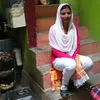Meet women from rural India who forge the way for themselves and their communities
In this essay, Zarina Screwvala, Co-founder of Swades Foundation, recalls some of the women microentrepreneurs from Raigad district of Maharashtra she came across in her non-profit work with husband Ronnie Screwvala.

Trishya Screwvala, Zarina Screwvala & Ronnie Screwvala along with Sir Fazle Hasan Abed, founder of BRAC
When we began our journey to help lift a million people out of poverty, knowing that we knew nothing, Ronnie and I undertook a wonderful year of study, travelling extensively meeting NGOs communities, philanthropists, corporates, and government officials. Our study finally took us to Bangladesh where Ronnie and I had the privilege of meeting Sir Fazle Hasan Abed, Founder of BRAC. I was star stuck enough to ask for a photo with him. ‘Women can manage poverty; they can also manage wealth’—this inspiring thought by an amazing gentleman has been a driver for me personally.
Over the years we have learnt that every challenge can become an opportunity, so when we speak of women facing challenges in rural India, rather than a sob story of deprivation, there is plenty of inspiration and ‘can-do’ attitude that for me is the key to solving all problems.
I believe challenges are there to be solved and to help us to grow and overcome and thus be capable of solving greater challenges in the future. Challenges help us to grow, to learn, and to become stronger.
With this in mind let us discus this question: What are the key issues women in rural areas face and how can they be addressed?
I think the most important challenge is mindset. When we first started to work in this sector, we asked many people, ‘what is poverty?’ We got many different answers. Mostly everyone said it’s the lack of some physical need, home, money, etc. But during the course of our work, we came to realise that poverty was actually something more than this and perhaps in some ways more heartbreaking. Poverty is both mental and material.
Material poverty we are all familiar with, but what is mental poverty? For me, mental poverty is the lack of the ability to dream of a better future for myself or my family, a lack of hope, a lack of aspiration. A belief that things are like this and will always be like this.
A woman in a village thinks to herself: ‘I walk miles for water, my older daughters don’t go to school but joins me in fetching water and there is nothing I can do. My elder daughters and I have to wait until dark to relieve ourselves and there is nothing I can do. Sometimes I cannot feed my children, there is nothing I can do. My old father has a heart problem, there is nothing I can do’. This, for me, is the most heartbreaking thing I have seen. In both men, women, and youth.
And this is the key to breaking the utterly vicious cycle of poverty, to develop a ‘can-do’ attitude. And this is often more difficult than building a toilet or water structure.
Rural women: a beacon of hope
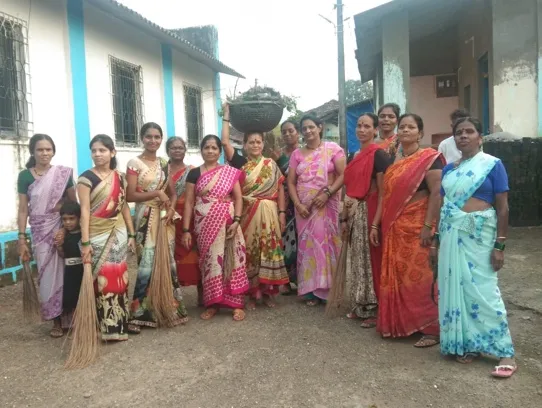
Meet the women of Bhimnagar village in Raigad district, Maharashtra. They were facing a lot of hardships for decades where they had to bear the burden of managing water, poor sanitation facilities, improper roads, and public services in their village. All these issues were neglected due to political disputes amongst the male fraternity and, gradually, this started affecting the development of the village. Women were struggling for basic necessities.
One day, two ladies, Sapna Gaikwad, a member of Mahila Panchayat, and Shubhangi Solanki, the president of the self-help group, came together with the same vision of empowering the village. They managed to encourage 80 percent women of the village to form a village development committee that not only worked towards the growth of the village but also built enough trust and unity in families of the village.
With the support and determination of all women, and with our guidance, they took multiple government schemes through, raising funds for constructing toilets and proper roads to commute, and getting access to water, which was a daily plight.
These women are also exploring opportunities for better livelihood and attending training for financial literacy. These all-female groups continue to meet once a month to discuss and solve various social issues that are affecting their community.
Other groups like these lead the change in their villages in our geography, facilitating our work in bringing water, sanitation, health, and more to the villagers.
Primary healthcare is another serious issue facing women and rural communities. One wonderful way to solve this is to create an army of strong women volunteers. Meet Pooja Sawant of Chavanwadi village in Mangaon, in Raigad district of Maharashtra. A motivated woman, she decided to do something apart from her daily household routine. She undertook healthcare training and now provides basic medical facilities at the doorstep of all villagers.
Her in-laws were against the idea but she persisted in her work. One day, her father-in-law’s health was in jeopardy and she managed to successfully help him by giving him initial medical handling before taking him to the hospital. That is when Pooja’s entire family stood by her and were confident about what she is doing for the villagers. She takes great pride in the work she is doing and also went on to become the president of women panchayat of her village.
Some women in truly unfortunate circumstances have created ambitious businesses and helped other women too.
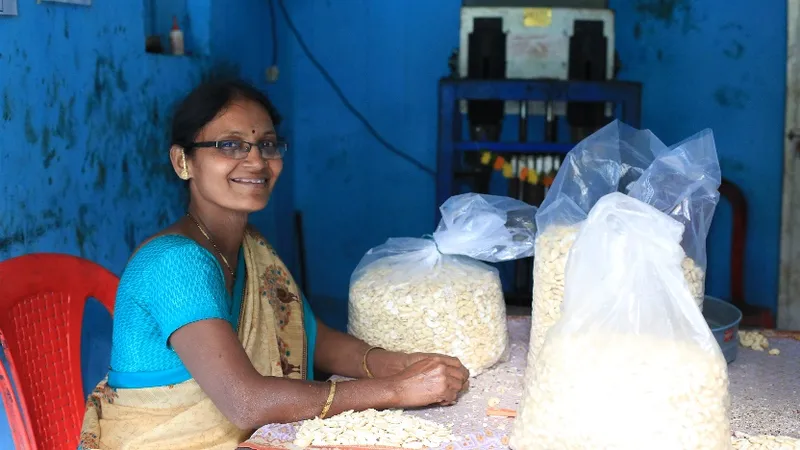
Meet Yogita Gaikwad from Koste village in Mangaon, in Raigad district of Maharashtra. Her life was devastated after the death of her husband but was brave enough to take a decision for her kids and their future. She procured a cashew processing machine on a loan and started the processing business, not fearing failures. She marched towards success under our guidance.
Her dedication and determination was noticeable when she expanded her business and managed to convince a few women in her village to join her despite objections from their husbands.
Later, with the support of these women, she was able to process 1-2 tons of cashew in a month, hence converting an income of Rs 5,000 per month to an income of Rs 25,000 per month.
Women associated with her also started supplementing the income of their families, gained new respect from the community, and felt more confident and capable than before.
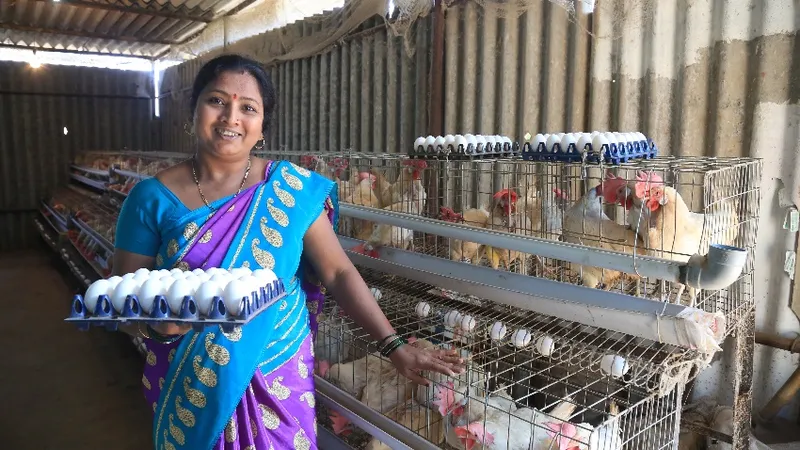
Meet Sonali Ubhare, an ambitious homemaker who took up layer poultry for additional income and inspired her husband, a rickshaw driver, to become an anchor farmer. Previously, she benefitted from a sewing programme that she commenced to support her husband to manage the household and education expenses. She later showed interest got into layer poultry in January 2017.
Since then, she has been managing the poultry all on her own, selling 70 percent of the output through wholesale and 30 percent through retail. Her devotion and scope for earning extra income has inspired her husband to become an anchor farmer, which added to their household income. Today, both entrepreneurs take great pride in their work.
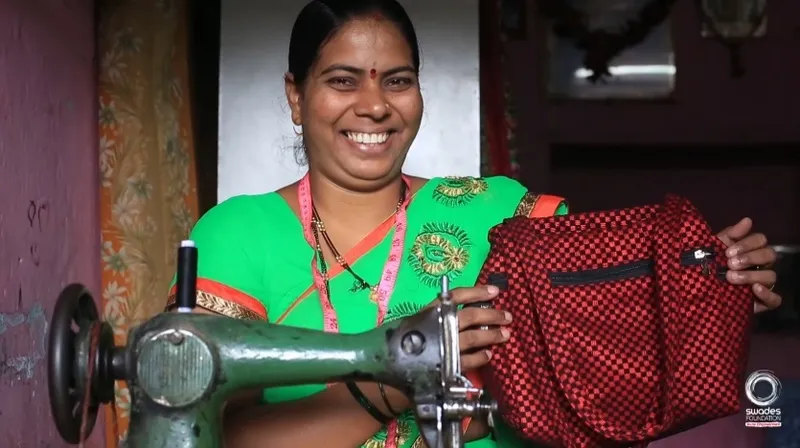
And, finally, meet Madhura Shinde from Patnus in Mangaon block of Raigad. Madhura’s life came to a standstill when her husband met with an accident that left him physically disabled. He had to quit his private job and life seemed insecure for them. But Madhura did not give up. She had the interest and skills in sewing. After some formal training, she started sewing handbags of different types. Her craft garnered notice and with her dedicated effort, she started receiving larger orders from neighbouring villages and nearby towns. This built up her confidence and she branded her products as ‘Madhura Bags’.
Today, she financially supports her entire family and aims to set up a shop to sell her bags and earn more money from which she wants to give her daughter the best possible education. For Madhura, the solution to her problem was within her – honing her skills and backing it with appropriate training helped her overcome her problem.
These are the few of the hundreds of inspiring women I have met during my numerous visits to rural Raigad. I have realised every woman you meet in rural India can inspire you with their ability to face and fight their challenges. Their ability to smile through their difficulties is something we can all learn from.
(Edited by Evelyn Ratnakumar)
(Disclaimer: The views and opinions expressed in this article are those of the author and do not necessarily reflect the views of YourStory.)


